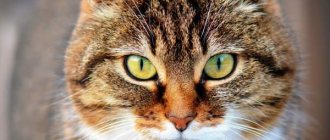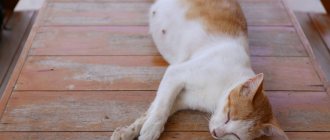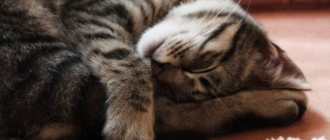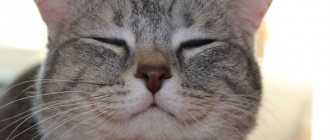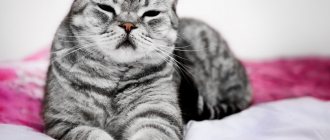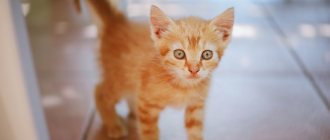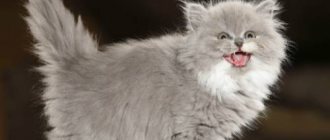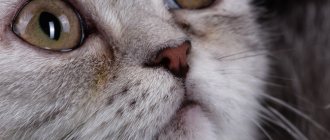There are many folk signs associated with the fact that a cat washes itself frequently. However, washing is also a mandatory hygiene procedure. Therefore, the owner should know when the cleansing process is normal, and in what cases intensive licking or refusal to wash indicates problems with the pet’s health. The owner should take into account the condition of the animal in order to contact a veterinarian in a timely manner.
According to veterinarian M. Reister, washing too often is a sign of constant stress, even if the cat outwardly behaves calmly.
What does folk wisdom say?
The cat has been an integral companion of humans for many centuries. Therefore, by observing their pets, people have learned to determine the future based on the cat’s behavior, although signs are not always realized. The most common superstition is that when a cat washes its paws while sitting on the threshold, it means guests. If the omen came true and the visitor turned out to be welcome, the owners should take a few hairs from the cat’s tail and place it on the visitor’s shoulder so that the guest will repeat the visit. When cats wash themselves, they predict the weather. There are such signs:
If during the hygiene procedure the pet pays attention to the tail, then you should expect bad weather.
- The pet slowly licks its paw and washes its hair - for a good clear day.
- He licks his tail and then covers his head - it will be cloudy or rainy.
- If he licks his fur, it will rain.
- Wash along the hair growth - the clouds will disperse and there will be sun.
- The cat washes itself, looking to the east - to clear weather, turning to the west - to bad weather.
- The cat feels where the wind is blowing from and turns to wash in that direction.
Preventing itching
Prevention of itching plays a very important role, so compliance with its basic measures will prevent the development of pathological processes accompanied by unpleasant symptoms.
Carry out hygiene procedures as often as possible - wet cleaning, washing cat bowls and washing their bedding.
Regularly clean your pet's ears and treat them with special medications.
Provide your pet with a balanced diet and try to prevent it from coming into contact with other animals.
Now everything has become clear why a cat can lick and itch. To solve the problem with a cat licking, you will have to be patient and time. And it doesn’t matter whether it’s a psychological or physiological reason. By providing your pet with enough attention and proper care, you can count on the fact that after some time his life will return to normal and his fur will be restored.
Why does a cat wash itself?
When cats bathe after eating, it is a natural hygiene process. This way the animal cleans and moisturizes the nose after eating and eliminates food residues and odors. The habit is explained by genetic inheritance from wild predators that wash their faces so as not to attract other animals with the smell. The cat also cleans itself after using the toilet to get rid of the smell of urine and feces. Often the animal licks intensely after being touched by the owner. This means that the cat washes off the foreign smell or tastes it, passing it through the Jacobson organ.
The special structure of the tongue allows the animal to use it as a kind of comb.
Every day, a cat devotes up to 30% of its waking time to cleaning its fur. The animal's saliva contains enzymes that eliminate pathogenic microorganisms from the fur. There are hooks on the tongue of pets, with the help of which the cat combs the hairs, and bites off some matted hairs with its teeth. While washing the animal, it stimulates the sebaceous glands and distributes sebum evenly throughout the fur, making it look shiny and neat. The lubricant also maintains a layer of air between the skin and fur and retains heat. Each cat has its own cleansing ritual, so some animals begin the process from the muzzle, others from the stomach, anal area or tail. The kittens are first licked by the mother, holding her with her paw, and the older babies wash themselves. If the cat does not wash itself, this is a symptom of the onset of the disease.
Pathological conditions
However, if your cat is constantly cleaning itself, it could be a sign of dermatological conditions or stress. When an animal is nervous, it washes itself thoroughly, but nervousness is felt in all movements. Most often, a cat washes a separate part of the body and licks it until a bald spot forms. Sometimes, being in a stressful situation, in addition to obsessive washing, the pet bites the skin until wounds appear. The cat also begins to actively wash itself in only one area of the body with dermatitis of various etiologies, which are often accompanied by itching.
The cat constantly licks itself: the reasons for this behavior
Absolutely every cat, regardless of breed, age and living conditions, tries to keep itself clean. Therefore, every day the pet is carefully licked several times - its fur coat, body, each paw in turn, tail and genitals. But sometimes the completely natural process of grooming an animal takes on the character of an obsession, and the cat constantly licks, and the reasons for this behavior are not always clear. This needs to be sorted out.
Cats usually lick and groom themselves after sleeping or eating. And this is normal, since cats are very clean by nature. But it happens that a cat begins to lick a specific place longer and longer. And for each situation there are reasons.
When a cat refuses to wash: the reason
Their mother usually monitors the hygiene of little fluffies.
The reason why a cat stops licking itself can be temporary. These conditions include:
- Post-traumatic complications after back injury. The cat washes itself, but cannot reach some areas of the body under the tail, the hind limbs.
- Obesity. Due to excess weight, the pet loses its flexibility, so it cannot reach its belly or tail.
- Wearing protective equipment. A collar, bandage or splint does not allow the cat to fully take care of itself, but after recovery the pet puts itself in order.
- Young age. The kitten is washed by the mother, since the baby does not yet know how to wash himself, but as he grows up he begins to lick himself.
But if the cat does not lick itself after using the toilet or completely refuses to wash itself, the owner should be alert to the following symptoms:
- Lack or decreased appetite.
- Dry and hot nose.
- Animals search for a dark place.
- Refusal to play or communicate with the owner.
- Vomiting or diarrhea.
The cat licks and itches, but there are no fleas
Even if no fleas were visible during a visual inspection of the cat, this does not mean that there are none at all. Very often, small black grains are visible among the fur, very similar to trash - these are nits. And sometimes, small transparent bubbles – lice eggs – are attached to the pet’s hairs.
However, not only fleas can cause a cat to lick and itch. This can also be done by other pathological microorganisms, such as scabies mites. In this case, the pet will have visible skin damage on the ears, ankles and elbows.
Other possible reasons for your pet licking and scratching include:
- Allergies to food, plant pollen, hygiene products, or insect bites (the cat scratches its face, scratches its ears, intensively licks and bites its paws). In this case, the veterinarian will recommend a diet to test for any specific component of the food that is causing adverse effects.
- Fungal and bacterial inflammation. A set of certain fungi and bacteria are found on the skin and mucous membranes of both humans and their pets. Being in a normal state, these microorganisms do not harm. But if the immune system weakens, their number quickly increases, and inflammatory processes begin. Fungal inflammation causes severe itching.
- Otitis is an ear infection that causes itching. A cat with otitis media itches and displays the following signs: it scratches its face, furiously rubs its ears, and shakes its head; swelling and redness of the ears appears, and purulent discharge from the ears.
- Skin diseases (pyodermitis, notoedrosis, demodicosis, etc.) arise as a result of skin pathologies. The rashes that appear on the skin cause severe itching and discomfort. Scabies can also be accompanied by external signs such as baldness.
What to do if the cat does not wash itself?
If you specifically wet an animal with water, you can force it to take care of its hygiene.
When the cat is healthy, but does not want to wash its butt because of disgust, you can help it and wash the anus area with a cleansing shampoo. Or moisten the anus with a drop of vegetable oil. A foreign scent will cause the animal to lick itself to remove the foreign scent. To teach a kitten to wash itself, you should stroke it more often, imitating the touch of its mother. To force and train your pet to wash itself, in hot weather you can slightly moisten the fur with water. The presence of liquid on the fur coat is unpleasant for the pet and it will begin to lick itself intensively.
If the cat is temporarily unable to wash itself, the owner should use dry pet shampoo or foam - Trixie, Esprit, Vets Best, Frontline. The products effectively eliminate excess sebum and make the coat beautiful and well-groomed. After cleansing, the pet should be combed. If the animal is injured, sometimes it is enough to help and support the cat or a part of the body that he cannot reach, and the pet will wash itself. If the owner refuses to wash himself for more than 2-3 days, he should take his pet to the veterinarian, especially if there are other signs of deteriorating health.
Treatment
The veterinarian prescribes treatment not that concerns the itching, but that concerns the very cause of the disease. The course of treatment consists of taking medications and includes both local and internal medications. Depending on the cause of the disease, the veterinarian may prescribe antibiotics, antihistamines (to eliminate allergies), and antifungals.
If scabies and redness of the skin are caused by an allergy to food or hygiene products, their use will have to be stopped and the food replaced with another, in general, to get rid of all allergens.
If there is a company
You may notice that your cat often shows off her butt. This is because among cats, showing their butt is a way of saying “hey, get to know me.” It's actually a great compliment for a cat to offer another cat to sniff her butt. Cats have an anal gland that gives other cats who sniff it a lot of information about who the cat is, strengthening their social bonds. Just like people, first impressions matter and you need to put in your best effort (or in this case, your ass). Your cat doesn't want to show off a dirty butt to anyone she might meet or say hello to, so your cat may want to keep it clean often in case there's company. Or just to show you who really like them their clean ass.
Overall, your cat is trying to feel healthy and look her best when she licks under her tail, no matter how unattractive it may look to the people around her. In the end, you can take comfort in the fact that your cat is taking good care of itself. However, if this seems intrusive or harmful to your cat, don't be afraid to consult a veterinarian who may be able to offer help.
Features of cystitis
Both male and female cats are susceptible to cystitis. But clinical manifestations in cats are much more common. This is due to anatomical features. In cats, the urethra is straight, short and wide, so salt crystals are excreted almost unhindered in the urine. In cats, the urethra is longer, has bends and narrowings, so mucus and salt plugs often appear in it, completely blocking the flow of urine (obstruction).
Neutered cats, whose genitourinary system functions differently than normal cats, are more prone to cystitis. In addition, stagnation of blood in the genitals leads to swelling, and this leads to spasms and urinary retention, stagnation in the bladder, salt loss, urolithiasis and chronic cystitis.
Sometimes, with cystitis, pets avoid using their litter box because they associate it with pain when urinating. And in some cases, the fear of the toilet remains even after complete recovery. Thus, cystitis can cause behavioral changes.
Protects against predators
Although your cat doesn't have to worry about survival, she has retained the instincts of her wild ancestors. However, the latter were not only predators, but also prey. Thus, in order to avoid being caught by possible predators, they had a reflex to be very careful, in particular to hide their scents. Target? Avoid tracking.
Thus, licking under the tail, where there is a particularly fragrant area, allows your furball to remove remaining excrement and urine and thereby camouflage itself.
In what cases is it necessary to consult a veterinarian?
If there are some accompanying symptoms, an animal actively licking itself or licking its nose should be shown to a veterinarian. The following signs should not be ignored:
- lethargy and lack of response to external stimuli;
- decrease in physical activity;
- increased body temperature;
- complete or partial loss of interest in food and, accordingly, weight loss;
- deterioration of the coat (thinning or hair loss);
- the appearance of sores and scabs on the skin;
- increased thirst;
- disruption of the digestion process and bowel movements;
- refusal of water;
- signs of intoxication and dehydration of the body;
- frequent vomiting.
You should not treat the animal yourself. Inept actions can aggravate the problem, so it is better to entrust the identification of the cause of the disease and the development of a treatment regimen to a veterinarian.
Sources:
https://veterinariya.com/koshka-lizhet-pod-hvostom.html https://okotikah.ru/bolezni/koshka-postoyanno-lizhetsya.html https://murkoshka.ru/povedenie/kot-lizhetsya-postoyanno. html
Obsessive licking
Does your cat constantly lick, nip or chew itself? Keep in mind that most cats spend 30 to 50 percent of their time grooming. But if you start to notice obsessive grooming, hair loss, or skin damage, it may be time to visit your veterinarian.
Obsessive licking may be a consequence of a disease. If your cat is constantly biting and licking his skin, this may indicate a neurological disorder, flea infestation, parasite infestation, or mental disorder. Stress often causes compulsive disorders in cats, such as excessive grooming at an early age. Events such as moving, home remodeling, adding a new pet or family member, separation anxiety, and lack of reward can easily trigger this behavior. And since licking calms and calms your cat, she will want to do it every time she encounters a dangerous situation. If this behavior is ignored, it can lead to self-harm. For example, psychogenic alopecia, or hair pulling, is a common condition that causes thinning hair, baldness, and skin infections.
